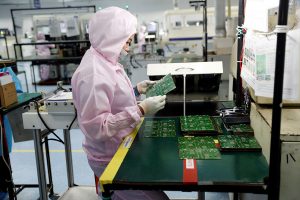THE Semiconductor and Electronics Industry Advisory Council (SEIAC) said that it will focus on improving the ease of doing business and developing a talent pool.
“The SEIAC aims to address the problems, issues, and concerns of industry players and find solutions for these,” according to Secretary Frederick D. Go, the special assistant to the President for investment and economic affairs, who also chairs the council.
In a statement on Wednesday, Mr. Go said: “The council will focus on the ease of doing business for those in the assembly, test, and packaging (ATP) industry and develop a talent pool for the integrated circuit (IC) design industry.”
SEIAC said the Technical Education and Skills Development Authority (TESDA) and the Commission on Higher Education will play a role in ensuring that training, reskilling and upskilling programs are effective.
“(This) will grow the integrated circuit design sector and strengthen the assembly, test, and packaging as well as the electronics manufacturing services (EMS) segments,” it said.
“This likewise realizes the vision of making the Philippines a consistent and reliable global partner packaging $70 billion of semiconductors, assembling $40 billion of electronics, and providing globally recognized IC design services by 2030,” it added.
Created through Administrative Order No. 31, the SEIAC is tasked with supporting the development, promotion, and competitiveness of the semiconductor and electronics industry.
At its June 2 meeting, the council approved the establishment of three technical working groups focused on investment and business environment, talent development and education, and infrastructure and cluster development.
“These groups will be led by government agencies such as the Department of Trade and Industry (DTI), TESDA, and Bases Conversion and Development Authority, along with industry and academic representatives,” SEIAC said.
“Additionally, the council endorsed a private sector representative nominee, pending presidential appointment, to ensure active private sector involvement,” it added.
Apart from the creation of the council, the administrative order also directed the DTI to develop the Philippine Semiconductor and Electronics Industry Roadmap to serve as the framework in accelerating the growth of the country’s semiconductor and electronics industry.
According to the DTI, the 2030 Philippine Semiconductor and Electronics Industry Roadmap is still being finalized. — Justine Irish D. Tabile

